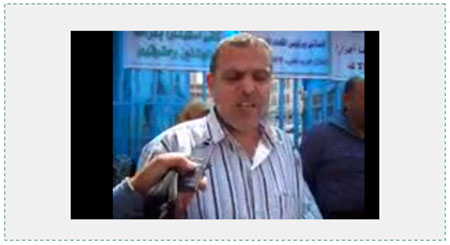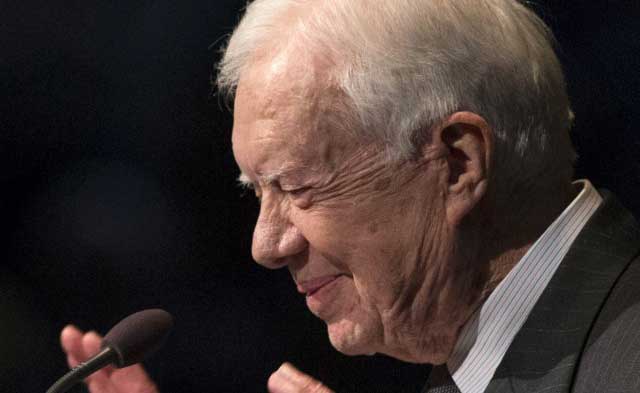Suspension of Suhail al-Hindi
1. Chris Guinness, UNRWA spokesman in the Gaza Strip, stated that the agency had decided to suspend Suhail al-Hindi from his position. He said that in view of an internal investigation during which “substantial information” had been presented from several sources, the decision was taken on February 26, 2017, “to suspend Suhail al-Hindi, pending the outcome of [the] investigation”[1] (Jerusalem Post, February 26, 2017). The announcement came after UNRWA announced, on February 23, 2017, that “Based on the due diligence carried out by the agency to date, UNRWA has neither uncovered nor received evidence to contradict the staff member’s denial that he was elected to political office.”[2]
2. However, after the UNRWA announcement, Suhail al-Hindi,chairman of the UNRWA staff union in the Gaza Strip,continued denying his election to Hamas’ political bureau in the Gaza Strip. In a conversation held on February 27, 2017 with a correspondent from the Palestinian news agency Ma’an, he claimed he was puzzled by the items published in the media, especially the Israeli media, about his election to Hamas’ political bureau in the Gaza Strip. “I have no connection to it,” he claimed. He also said he was surprised by UNRWA’s announcement of his suspension (Ma’an, February 27, 2017).
Previous Suspension of Suhail al-Hindi (2011) and UNRWA’s Submission to Hamas Pressure
|
3. It was not the first time Suhail al-Hindi was suspended by UNRWA because of his affiliation to Hamas. In September 2011 UNRWA suspended him from his teaching job for three months, apparently because he had met with Ismail Haniyeh. UNRWA said at the time that it was because of his “political activity,” i.e., his Hamas activity (Ynet quoting the AP, September 29, 2011). At the time Hamas exerted pressure on UNRWA to reinstate him, including protests by the de facto Hamas administration in the Gaza Strip which closed down UNRWA schools with 220,000. In the end he was reinstated, and remained in his position until the current suspension. |
4. The main responses of Suhail al-Hindi and Hamas to the 2011 suspension were:
a. Suhail al-Hindiclaimed he had received notice he would be suspended for three months without pay, and a warning that he would be fired if he continued his [political] activity. He termed the UNRWA decision “very dangerous” and threatened protests would be made(Website of the information unit of the de facto Hamas administration in the Gaza Strip, September 12, 2011).
b. Hamas de facto administration spokesman Taher al-Nunu condemned the UNRWA decision to suspend Suhail al-Hindi because of his meeting with Ismail Haniyeh. Al-Nunu demanded UNRWA recant, restore Suhail al-Hindi to his former position immediately and compensate him for damages incurred. He claimed the decision violated al-Hindi’s human rights and freedom, because UNRWA was not empowered to prevent its union members from having connections with “governmental and popular figures.” Al-Nunu also threatened that if al-Hindi were not reinstated, the UNRWA staff union would conduct activities that would “embarrass the agency”(Website of the information unit of the de facto Hamas administration in the Gaza Strip, September 13, 2011).
5. Hamas carried out its threat. On September 29, 2011, the UNRWA staff union declared a strike in all its schools in the Gaza Strip(Khansaa Filastin, September 29, 2011). Between September and December 2011 the union held a broad protest campaign, during which UNRWA schools in the Gaza Strip were closed several times. The campaign included 243 schools, 8,000 teachers and 220,000 school children(Paltoday, October 15, 2011).
6. According to reports, in December 2011 UN Commissioner-General Filippo Grandi decided not to suspend agency staff for external activities [i.e., Hamas activities] until the organization could determine clear criteria. The decision was made after Grandi met with local heads in the Gaza Strip when the protests following al-Hindi’s suspension escalated (aljazeera.net, December 12, 2011). Suhail al-Hindi said the UNRWA staff union, through middlemen, had reached an understanding with the agency, according to which workers would not be suspended for “external activities” [i.e., involvement in Hamas activities] until clear procedures had been set. In a phone conversation with al-Jazeera he said that he had returned to work and expected UNRWA to implement what had been agreed upon and not repeat its actions(aljazeera.net, December 12, 2011).
7. Thus Suhail al-Hindi returned to work at UNRWA in December 2011 and openly continued his activity in Hamas: on September 16, 2012, elections were held for the UNRWA staff union in the Gaza Strip in which two lists proposed candidates. One was the Hamas-affiliated list, al-Mahaniya, and the other was the al-Karameh list. Fatah boycotted the elections, claiming Hamas controlled them and created difficulties for Fatah activists (alresala.net, September 16, 2012). On September 17, 2012, the Palestinian media reported that Hamas had won a decisive victory in the elections.
8. According to Mustafa al-Sawaf, a Hamas-affiliated political analyst and commentator in the Gaza Strip, the elections results contradicted all the predictions of a decline in popular support for Hamas. He claimed the results confirmed the opposite, that Hamas enjoyed great popularity(Paldf, September 17, 2012). On September 18, 2012, the Hamas forum Paldf congratulated al-Hindi’s list for winning the elections(Paldf, September 18, 2012). Al-Hindi announced the list had won 92% of the votes, that is, 25 of the 27 union seats(Dunia al-Watan, September 18, 2017).
| 9. In conclusion, in recent years there have been several rounds of power struggles between Hamas and UNRWA which UNRWA has consistently lost ground.[3] The suspensions of Suhail al-Hindi have not been isolated, unrelated cases but rather illustrate the double identities of officials who are employed by UNRWA: they are both activists or supporters of Hamas, a terrorist organization seeking to destroy the State of Israel, and UNRWA employees, including teachers and school principals, who are supposed to serve as educational role models. The results of previous power struggles between Hamas and UNRWA clearly showed Hamas’ strength among UNRWA employees and its determination to preserve that power (including by shutting down UNRWA schools). Hamas does not intend to give up its control of the educational system in the Gaza Strip, which is considered an important tool for indoctrinating generations of young Gazans with its extremist Islamist ideology to prepare them to join the movement and its military-terrorist wing (the Izz al-Din Qassam Brigades). |









